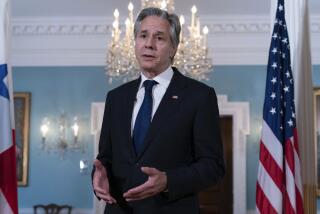U.S. Would Let Hussein Keep Power : Scenario: If Iraqi leader pulls out of Kuwait, Bush won’t insist on his ouster, Administration officials indicate.
- Share via
WASHINGTON — The Bush Administration signaled Sunday that it would be willing to settle for an Iraqi pullout from Kuwait and not insist on the ouster of President Saddam Hussein or the destruction of his military power.
The position was outlined in separate television appearances by John H. Sununu, the White House chief of staff, and Brent Scowcroft, the President’s national security adviser. Both appeared in Helsinki just after the summit.
Sununu’s comments came in response to a question on whether it would be “a satisfactory outcome for the United States” for Hussein to retain his power, his army and his oil revenues after he withdrew from Kuwait.
“Well, it is,” he replied on ABC’s “This Week with David Brinkley” program, “in the sense that . . . we will at least have returned, in terms of the legitimacy in Kuwait, to the previous condition.”
Separately, Scowcroft told NBC’s “Meet the Press”: “I’m not sure that we need to solve all of the problems relating to Iraq when we solve the immediate one, which is the aggression against Kuwait.”
Their remarks appeared to be designed to discourage hopes by some in Congress, expressed before the Helsinki summit, that Washington would press relentlessly for the ouster of Hussein and the destruction of his military forces.
Indeed, Sununu denied flatly on Sunday that the need to oust the Hussein regime had ever been “explicitly stated as a goal.”
But Sununu cautioned that Washington would be satisfied only if Saudi Arabia, Syria and Egypt remained committed to resisting Iraqi aggression, with American support--in other words, if Hussein emerged with far less power than he had before.
“It will certainly be a different (Persian) Gulf area,” he said.
Asked if it would be “an attractive scenario” if Hussein continued to have access to a large supply of poison gas, soldiers and equipment, Sununu replied: “Well, it’s not the best of scenarios, but if . . . the United States has been able to leave assets in place, equipment that can be used by our allies, and the capacity to send our folks back quickly to utilize that equipment, I think we might have at least the beginning of a way of dealing with all the points that you have raised over a reasonable period of time.”
Sununu also appeared to hint that the United States might accept an alternative “legitimate” government in Kuwait to that of the Sabah royal family, which ruled the oil-rich country before Hussein’s forces invaded on Aug. 2.
Some analysts believe Hussein might be persuaded to withdraw from Kuwait if it were made clear that the emir of Kuwait and his family would not be restored to power. In recent days, the Administration has avoided talking about restoring the emir.
But Scowcroft listed restoration of the monarchy as an Administration goal, as President Bush has done several times in the past.
“That is not negotiable,” Scowcroft said. “We cannot let Saddam Hussein profit from his aggression. . . . We think that it is not negotiable.”
Rep. Lee Hamilton (D-Ind.), chairman of the House Foreign Affairs subcommittee on the Middle East, said he has been encouraged by the Bush Administration’s recent rhetoric.
“By all odds,” Hamilton told NBC News, “the most important thing that has happened here in the last few days is that we have turned back from the assumption that war is inevitable, and we’re now beginning to think in terms of resolving this crisis without going to war. That’s not a sure thing, by any means, but we’re thinking that way.”
More to Read
Sign up for Essential California
The most important California stories and recommendations in your inbox every morning.
You may occasionally receive promotional content from the Los Angeles Times.












